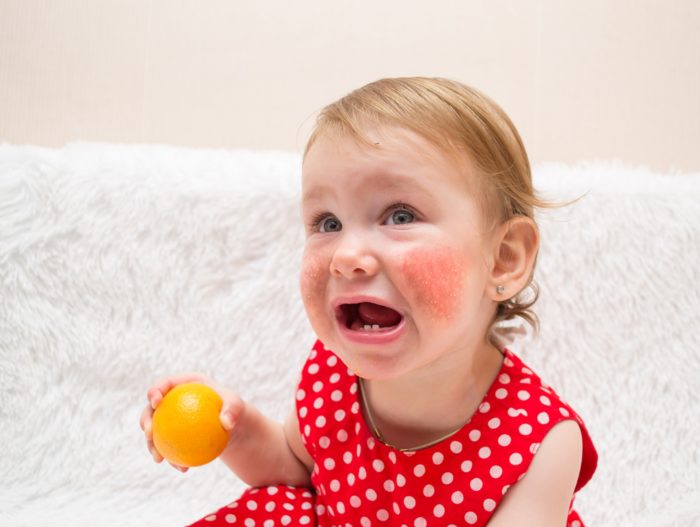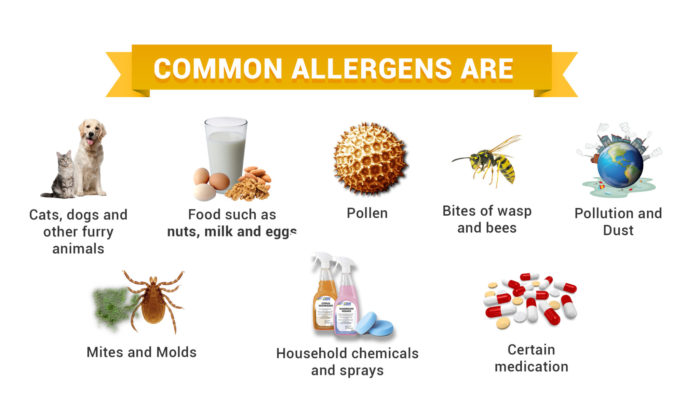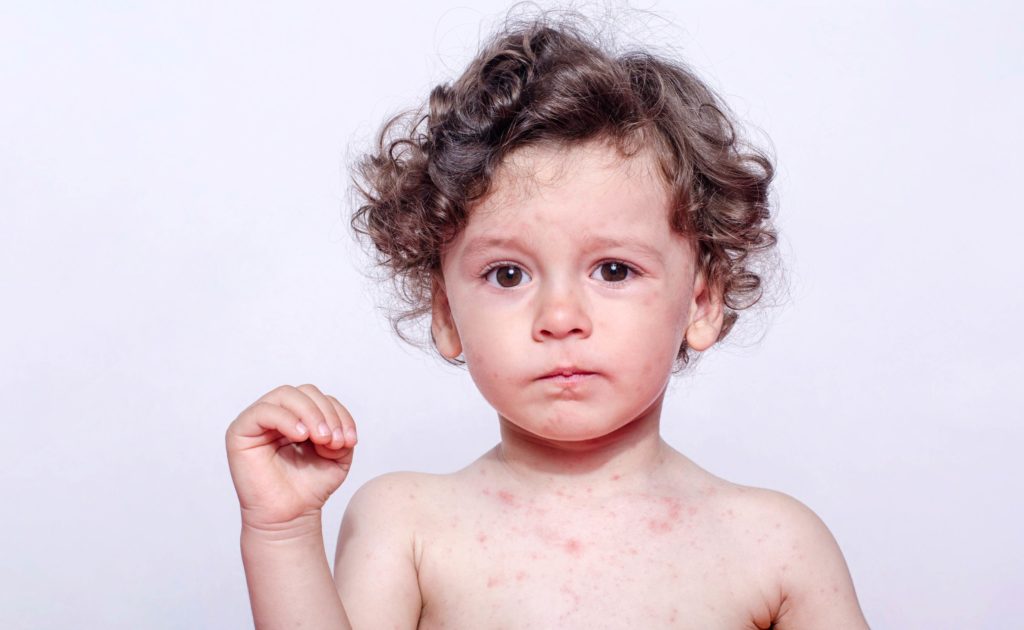Childhood allergies, oh what a perplexing and bursty ailment! The immune system going haywire in response to an innocuous substance called an allergen. It’s like the body suddenly screams “intruder alert!” and releases antibodies that cause a flood of histamine and other chemicals that inflame various parts of the body, resulting in discomfort – from itchy eyes to skin rashes.

Children with seasonal allergies get hit especially hard during spring when trees and flowers burst into bloom. Pollen or mold spores can send them sneezing or coughing fitfully as they struggle to catch their breath. In some cases, these allergies may even lead to asthma attacks for children already struggling with respiratory issues.
But fear not! With proper diagnosis (through skin prick tests or blood tests conducted by an expert allergist), there are several treatment options available – ranging from antihistamines to immunotherapy (allergy shots). It is crucial for parents to work closely with healthcare providers in developing a personalized plan that effectively manages their child’s allergies without disrupting daily life activities.
Common Allergens in Children: Food, Pollen, and More
The enigma of food allergies has long been a perplexing conundrum for parents. Their child’s adverse reactions can range from mild to severe, manifesting as hives, swelling, vomiting or even respiratory distress. The gravity of the situation cannot be stressed enough and it is imperative that parents remain vigilant about their offspring’s dietary intolerances.

To add to this already bewildering mystery, pollen is yet another inscrutable allergen that plagues children seasonally. Posing a threat during certain times of the year, nasal symptoms such as sneezing and congestion are commonplace among those affected by this phenomenon. However, in some cases asthma-like symptoms characterized by wheezing and shortness of breath may also arise.
As if these two weren’t enough, dust mites emerge as an additional confounding factor prevalent across many households worldwide! These minuscule creatures lurk within household dust and incite similar allergic responses to pollen allergies with regards to nasal symptoms.
Given the complexity inherent in identifying allergy triggers specific to each child’s condition and management thereof; seeking assistance from an allergist becomes indispensable for concerned parents at their wit’s end. Allergy shots recommended by trusted allergists offer effective long-term mitigation against future allergic episodes- A silver lining amidst all the confusion!
Seasonal Allergies in Children: Symptoms and Treatment
The symptoms of seasonal allergies in children are a perplexing array of sneezing, itching, and hives. What could possibly cause such burstiness of reactions? Well, it turns out that environmental factors like pollen or mold spores are the culprits behind this enigmatic condition. Children with hay fever may be bewildered by the incessant itchiness in their eyes and nose, runny noses and congestion.
To mitigate these puzzling symptoms, antihistamines are commonly prescribed for children suffering from seasonal allergies. These medications work their magic by blocking histamine release when allergens come into contact with the body’s immune system. Histamine is a curious compound that triggers all sorts of swelling and allergic reactions within the body – but antihistamines help alleviate these symptoms by reducing its production.
However, for those kids whose allergy symptoms seem to defy explanation despite medication use alone (i.e., severe cases), immunotherapy might be recommended as an additional treatment option. This therapy involves regular injections of small amounts of allergen over time to desensitize the child’s immune system to it; thus reducing IgE antibody production responsible for triggering life-threatening allergic reactions. It is important to note that allergy shots should only be administered under the supervision of an allergist who specializes in treating childhood allergies – lest we add more bewilderment than necessary!
Diagnosing Allergies in Children: What to Expect
The perplexing nature of childhood allergies can leave parents scratching their heads in puzzlement. Symptoms such as a runny nose, itchy eyes, and asthma-like wheezing or coughing are common indicators that something is amiss. But with seasonal allergies lurking around every corner, the diagnosis process becomes even more convoluted.
Doctors will take note of these symptoms and order an allergy test if they suspect that your child may have allergies. The most popular type of examination involves small amounts of allergens being injected into the skin via needles to see if there’s any redness or swelling at the site within 15-20 minutes.
Parents should be aware that not all children experience allergic reactions immediately after exposure – sometimes it takes repeated contact before an allergy develops. In fact, studies indicate that up to 40% of youngsters exposed to specific allergens never develop any issues whatsoever! Nevertheless, if you believe your child might be experiencing allergy-related symptoms due to family history (or other factors), it’s best to consult with a pediatrician and get tested without delay!
Treating Allergies in Children: Medications and Immunotherapy
The perplexing world of children’s allergies requires a burst of knowledge and cautiousness. The first line of defense is often medication, but before administering any antihistamines or decongestants, consult with your child’s doctor. These medicines can relieve itching and sneezing caused by allergens such as pollen, animal dander, and tree nuts.
Nasal sprays are another option for managing allergy symptoms in children. However, it’s essential to note that saline or corticosteroid nasal sprays should only be used under a doctor’s guidance and not for extended periods.
Monitoring your child’s symptoms closely is paramount if you suspect they have an allergy. Common causes include food allergies, seasonal allergies (such as hay fever), insect bites or stings leading to hives or rash on the skin, difficulty breathing/swallowing or cold-like symptoms like runny nose/watery eyes.
Effective treatment depends on working with healthcare professionals since every child has unique needs when it comes to managing their allergies. Immunotherapy involves gradually exposing the body to small amounts of allergen over time until immunity builds up against them; however this approach should only be considered after consultation with an allergist who specializes in childhood allergy management.
Allergy Shots for Children: How They Work and Who They’re For
Immunotherapy, also known as allergy shots, presents itself as a viable treatment option for children plagued by allergies. By exposing the child to minuscule amounts of their allergens such as pollen or dust mites, these shots work gradually to build up immunity and reduce the severity of symptoms.
Typically reserved for those suffering from severe reactions that fail avoidance through other methods, immunotherapy may be suggested even in cases of food allergies or respiratory distress caused by allergies. However, it is important to note that not all types of allergies can be addressed with allergy shots.
Before beginning this course of treatment, precise diagnosis via skin testing or blood tests measuring IgE antibodies must certify the presence of allergens triggering allergic response in the child’s body. Only when approved by an allergist will regular injections over several months (even years) commence.
While proven effective in significantly improving childhood allergies and reducing dependence on medication, achieving results requires steadfast commitment from both family and child alike. Consistent appointments are necessary for further injections alongside monitoring symptoms during peak pollen seasons/exposure to triggers. Yet for some who have exhausted other options-children experiencing extreme allergic reactions-immunotherapy could provide welcome relief from their debilitating symptoms.
Working with an Allergist: When to Seek Professional Help
In situations where a child is plagued with chronic cold-like symptoms or has an enigmatic reaction to certain foods, it may be necessary to turn towards the expertise of an allergist. These specially trained physicians can provide effective diagnosis and treatment for children of all ages that suffer from allergies. Through allergy testing, allergists are able to identify the specific trigger responsible for causing allergic reactions.
Infants and young children who struggle with asthma may also find relief by consulting with an allergist. By devising a tailored treatment plan, these specialists can help manage symptoms and prevent future flare-ups through various means such as medication in the form of inhalers or nebulizers and lifestyle adjustments like eliminating upholstered furniture or other potential triggers from their immediate surroundings.
For those children whose allergies stem from common sources like milk or seasonal triggers such as grass pollen, seeking assistance from an allergist could potentially change their lives for the better. In cases where medication alone fails to produce results, immunotherapy – commonly referred to as allergy shots – might be recommended instead. This revolutionary approach involves gradually exposing small amounts of the offending agent over time which helps desensitize the body’s response thereby reducing allergic reactions in both short- and long-term scenarios alike.
Prevention and Management of Childhood Allergies: Tips for Parents
The role of parents in preventing and managing childhood allergies cannot be overstated. It’s a labyrinthine process that requires identifying potential allergens, such as pollen, dust mites, pet dander, and certain foods like peanuts or shellfish, which are known to trigger allergic reactions in your child. If your little one experiences gastrointestinal symptoms after eating certain foods – well my goodness! That could indicate the presence of a food allergy.
Timing is everything when it comes to exposing your child to outdoor activities during allergy season since high pollen counts increase their risk of developing allergic reactions. But did you know that factors such as exercise can also trigger these pesky allergies? Yep – increased breathing rates cause cells in the body to release chemicals that exacerbate this already perplexing issue!
If you’re struggling with suspicions about whether or not your child has allergies – don’t fret! Start by consulting with your pediatrician who can refer you to an allergist for further testing and diagnosis. Allergy treatments may include medications or immunotherapy (allergy shots) depending on the severity of symptoms.
To avoid exposure to potential allergens at home, consider implementing some allergy-proofing measures like using hypoallergenic bedding and vacuuming regularly. And hey – why not have your kiddo bathe after playing outside or coming into contact with pets? Sounds simple enough right?
By taking proactive measures and working closely with healthcare professionals though all this burstiness, parents can effectively manage childhood allergies and improve their quality of life for themself as well as their precious little ones!

